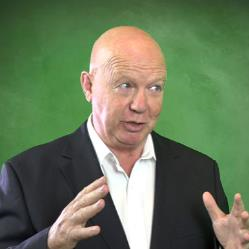 "New managers should not assume they know the answers" - discussion with John Smibert.
"New managers should not assume they know the answers" - discussion with John Smibert.
A friend of mine, Tom, was a successful salesperson and had recently been promoted into a sales management role. He knew this was a high risk time. A high percentage of new sales managers are less than successful in their first year or two as a sales manager. And if you don't build credibility early it is hard to catch up later. Tom wanted advice on the first steps he should you take to get off on the right foot and make an impact.
 So I asked Tony Hughes for his advice on this question.
So I asked Tony Hughes for his advice on this question.
I thought Tony's response was spot on. Firstly he said don't pretend that you have all the answers - even if you think you do. You would't do that if you were selling to a prospective customer so why would you do it with a team member. And in particular do not assume any past poor performance on their part is their fault. You need to build rapport and trust with your sales team - and the best way to do that is ask questions and listen - conduct a discovery of the issues and challenges they face - and then explore what can be done to put solutions in place.
Secondly, Tony said "go and interview your very best customers, and don't ask them why they bought from you over the competition but ask them why did they buy anything at all. What were the trigger events that occurred in their world that caused them to decide that they needed to go to market, because that'll give your salespeople clues about where they can go find opportunity".
Tom thought this was great advice and put it into action with good results.
See Ton'y's full response below.
Tony is a leading author and keynote speaker in the world of B2B sales and sales leadership. He is well known for his strategic selling book "The Joshua Principle" and for the RSVPselling methodology.
See more of the 'TALKING SALES' series here
Interview
John: Hello! I've got Tony Hughes with me again - welcome back, Tony!
Tony: Hi, John - great to be with you!
John: Tony, you give advice to sales managers all the time, particularly sales managers newly moved into the role.
Tony: Yes.
John: That's the most challenging time for typically successful sales guys just being promoted into a sales management role. What's the sort of advice you'd give a person just moving into that role?
Tony: For anybody taking the sales management role in a new organisation where things are clearly broken, the advice I would give them is, the first thing is go and listen to the salespeople. You really want to build rapport and trust with them, and if they're not successful it isn't really because they're not good; there's some other impediment to their success. So go and listen to people.
John: That's great advice. The best sales managers I've ever known are the ones that really are on the side of their people, understanding what their issues are, understanding what the roadblocks they've got to being successful and getting the roadblocks out of the way for them.
Tony: Yes. Turning up in an organisation and pretending you have all the answers before you understand is a big mistake, the same as if you did that with a prospect. The second thing that I'd recommend they do is they go and listen to their best customers. Most people go and do loss reviews when they lose business to help fix the problem of competing effectively, but that doesn't help you build pipeline. If you're a new sales manager, you've got to drive revenue, right? So, what I'd say is go and interview your very best customers, and don't ask them why they bought from you over the competition but ask them why did they buy anything at all. What were the trigger events that occurred in their world that caused them to decide that they needed to go to market, because that'll give your salespeople clues about where they can go find opportunity.
John: And as you know, I talk a lot with Cian McLoughlin, and Cian talks a lot about the fact that we really need to understand why we've been successful, not just why we've lost.
Tony: Yes.
John: And that's what you're saying. As a sales manager, new to the job and a whole lot of salespeople you're working with, go and talk to their customers and work out why they have been successful so that you can reinforce it.
Tony: Yes. And why they went through change in their own organisation. About 25% of the deals that get lost from people's CRM systems, as allegedly qualified opportunities, get lost to do nothing; it's the customer just staying in current state. So, we need to help the customer be committed to making the change, and also to make sure that they've got the necessary funding to go ahead. Once our salespeople understand why customers change state, why they went to market in the first place, that'll help equip people to start to have a narrative around what they need to do as an organisation, to change what the business case looks like, where the risks are, and then you can start to lead with some insights.
John: Great advice, Tony. I think that would be great for the new sales managers, and there's probably more advice you've got to give - let's cover that another time.
Tony: Great - thanks, John!
John: Thanks, Tony!
****************
More interviews with Tony Hughes:
***************

Your Invitation: I invite you to join the Sales Leader Forum group on LinkedIn where you can experience informative discussions with your peers and sales thought leaders on subjects like the one we have discussed here. I also invite you to subscribe to the
- Sales Leader Resource Centre here
- Sales Leader YouTube channel here (300+ sales leadership videos)
Please Share: If you valued this article, please share via your Twitter, LinkedIn, Google+ and Facebook social media platforms. I encourage you to join the conversation or ask questions. So feel free to add a comment on this post - I promise to respond. If inclined please follow my LinkedIn post page here.
Want to touch base? If you have questions please feel free to contact me - email: john.smibert(at)salesleaderforums.com, Phone: +61 404857893 or Skype: john.smibert